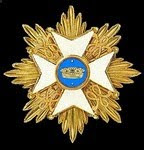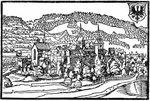Chefs: From 12/9/1755 Major General Heinrich Adolf von Kurssell, died 26/9/1758 of wounds received at Zorndorf; from 8/12/1758 Major General August Wilhelm von Braun, later Lieutenant General, to 1770
During that winter the prisoners from the 2nd Battalion returned via Jägerndorf and Peterswald. The regiment was with the King's army besieging Schweidmitz in 1758 until the storming of the Galgenberg on April 16th; the grenadiers were at Olmütz. Frederick left Bohemia in early August and IR37 went to the Oder to reinforce Dohna's Corps and fought at Zorndorf on August 25th. Its chef Major Gneeral von Kurssell, was mortally wounded. AFG1 shows about 25% casualties in the two battalions. After Zorndorf the regiment was with Prince Frans von Braunschweig at Beeskow. The grenadiers were at Hochkirch on October 14th. As part of Wedell's Corps it was involved in the defeat of the Swedes at Fehrbellin on 22nd September. Recruiting in Lower Silesia continued to be easy.
In 1759 the regiment fought under von Knobloch at Saalfeld on 26th March, at Kronach in May and then on July 30th was with the King heading towards Crossen. But at Kunersdorf on August 12th the regiment was nearly wiped out attacking the Grosse Spitzberg, losing 16 officers and 992 men. AFG1 shows about 70% casualties. On November 9th the grenadiers joined Finck's Corps and were captured at Maxen.
On June 23rd 1760 the 1st Battalion was captured after fierce fighting at Landeshut with Fouque. The 2nd Battalion was with Zieten's Corps at Freiburg. After spending time at Wahlstadt with Zieten and then in camp at Bunzelwitz in August, it went with Platen to the siege of Kolberg, which began on October 2nd. On October 25th the 2nd Battalion was captured at Treptow, and the 1st Battalion suffered a dreadful retreat from Kolberg to Stettin.
In 1762 it was in Silesia, fighting at Adelsbach on July 6th, Friedland July 8th and on July 21st stormed the southern fortifications of Leutmannsdorf "up a coverless slope". Its last action in the war was to help besiege Schweidnitz for 63 days. In 1763 it had 1485 Prussians, 27 Saxons and 342 "foreigners". Christopher Duffy (AFG1) calls it "an unlucky regiment", as it was so often captured in the Seven Years War.
And this was the uniform in 1756:




















This is a lovely green. Super job, David!
ReplyDeleteThanks, Jon. The colour compensates for the simplicity of the flags, I think. :-)
ReplyDeleteAll the best,
David.
More stunning work, David. I agree with Jon; the green is very eye-catching. Wouldn’t that flag look wonderful on the tabletop? Especially waving above the vivid red of the fusilier mitres.
ReplyDeleteThank you again for sharing. Your new blog entries are always special.
Bill
Thanks, Bill. Glad you like it! The green and the red would make a very striking combination, I agree.
ReplyDeleteThanks too for the encouragement; every positive comment I receive really helps keeps me going at this... :-)
All the best,
David.